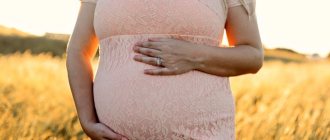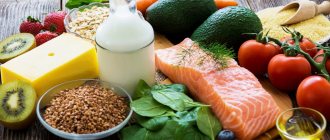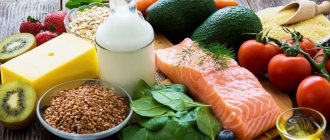During pregnancy, proper nutrition can begin in any trimester. However, it will be better for the child if the mother eats healthy and nutritious foods even before the moment of conception. The diet at different periods differs slightly in calorie content and composition of products. This is explained by the process of development and growth of the embryo, changes in its physiology. Organs and tissues are formed during certain periods and require the supply of appropriate nutrients.
Rules for organizing nutrition for a pregnant woman The choice of certain products is directly dependent on the female body mass index (BMI). It can be calculated by dividing your weight by the square of your height.
For example, if you weigh 70 kg and are 1.75 cm tall, then your BMI will be 70:(1.75x1.75)=23. There are standards for required weight gain based on BMI. The principle is simple, the greater the fat mass, the less growth is recommended.
| BMI | Weight | Gain during the entire pregnancy period, kg | 2nd and 3rd trimester, increase per week, g |
| 18-19 | Small | 10-18 | 500 |
| 20-25 | Norm | 11-16 | 400 |
| 26-30 | Extra | 7-12 | 300 |
| More than 30 | Obesity | Up to 6-7 | 250 |
The fetus receives nutrition and is freed from waste products through maternal blood. The embryo receives oxygen, microelements, biological compounds, food components, vitamins, and hormones. Therefore, you need to eat more foods of natural origin, diversify your diet, and, if possible, monitor the combination of carbohydrates, proteins, and fats. You need to drink more and more often – up to 10 glasses of water. Avoid spicy foods and spices for now. An infant's taste buds develop during the seventh month of development.
If you are not sure that you can independently control the processes of nutrition and weight changes, then paid pregnancy management will help you. Having signed a contract, you will then be under the supervision of an experienced gynecologist.
Nutrient elements
The main building substances necessary for the body of the baby and his mother:
- Proteins. Protein compounds go into the formation of cells of the fetus, placenta, uterus, and are contained in the amniotic fluid. They prevent stressful situations and relieve attacks of toxicosis. There are two types of proteins - animal (contain many amino acids) and plant. A large amount of proteins can be obtained by eating meat (veal, lamb, chicken, turkey, horse meat), milk, cottage cheese, sour cream, curdled milk, cheese, freshly caught fish, shrimp, eggs. Choose foods that contain less fat. You can supplement your diet with legumes, mushrooms, seeds, and nuts. They are rich in vegetable oil and contain less protein.
- Lipids or fats. Necessary for the structural components of tissues and are a source of energy. The functioning of the nervous and endocrine systems and the quality of blood clotting depend on their quantity. They protect the embryo from sudden changes in external temperature. Lipids are involved in the absorption of nutrients - calcium, retinol, magnesium. Lard and butter contain solid fats - sources of vitamins D and A. Vegetable oil is rich in liquid fat and vitamin E. All of them are healthy, necessary for the development of the baby, and therefore must be present in the diet.
- Carbohydrates. This is an energy reserve for the child’s body, which is constantly spent on cell division from which different organs are formed. Carbohydrates can only come from outside, and this process must be constant in equal quantities. If there are few sugars, then proteins will be used. And if there is a lot, it will lead to an increase in the weight of the woman and the embryo, and an allergy may develop. Bakery products and whole grain cereals are rich in carbohydrates. Fresh fruits and vegetables will help fight nausea and constipation in the second half of pregnancy.
Learning to eat healthy during pregnancy
Women can make many common mistakes during pregnancy. Every mother should know the basic rules and features of nutrition during this “special” stage of life1,2.
Eat regularly
Pregnant women have a very capricious appetite. “Today I don’t feel well in the morning, I have no appetite - I won’t eat anything. In the evening I get hungry - I “attack” the refrigerator and sweep away everything.”
This approach is fundamentally wrong. If a pregnant woman eats irregularly, from time to time, she will constantly have digestive problems: constipation, heartburn, bloating. To avoid this, you should stick to the regime. Even if there is no appetite at all, you need to eat at least a little at the right time.
Follow the regime
“In the middle of the night I woke up with a ravenous appetite. I go to the refrigerator and eat everything: yesterday’s pilaf, buns, a piece of cake and herring with orange juice.” This behavior is familiar to many pregnant women.
Usually women indulge their weaknesses during the period of bearing a child, and this is completely in vain. Abundant night snacks lead to disturbances in the digestive tract and the gain of extra pounds.
If you feel like having a snack late in the evening or even at night, it is better to drink a glass of low-fat kefir or yogurt. This will help relieve the feeling of hunger, you will be able to fall asleep easily, and there will be no heaviness in your stomach.
Drink more water
A pregnant woman's body reacts very sensitively to any deviations in nutrition. If a woman eats dry food, her risk of constipation, gastritis and other gastrointestinal diseases increases significantly. To keep your digestive system working like a charm, it is important to regularly eat liquid foods and drink enough fluids (water is best). Light soups made from lean meats and fish are always a priority.
The rate of water consumption depends on the characteristics of the woman’s body and the duration of pregnancy, but on average it is recommended to consume at least 2300 ml of liquid per day.
Sugary carbonated drinks should be completely avoided. It is better to prepare homemade fruit drinks, compotes and herbal teas. You should also avoid strong tea and coffee.
Breakfast is an important start to the day
The first meal of the day “launches” the entire digestive system and awakens the entire body. Neglecting breakfast leads to overeating during the day or evening and has an adverse effect on the pregnant woman’s body. If you feel nauseous in the morning and don’t feel like eating at all, then you can drink a little yogurt or fruit drink.
Avoid spicy and salty foods
The first months of pregnancy are usually accompanied by a strong craving for “spicy” and “salty” foods. It is advisable, but not necessary, to completely avoid spicy and overly salty foods during pregnancy - it is important to know when to stop. Salty and peppery foods can lead to heartburn and fluid retention in the body of a pregnant woman.
Keep it in moderation
I eat for two. This is a favorite nutritional principle for many pregnant women. Eating for themselves and the baby, they often exceed all acceptable standards so much that in a short time they gain an extra 10-15 kg.
This is a fundamentally wrong approach. In the first trimester, the baby growing in a woman’s belly is still very tiny. He doesn't need an adult portion of food. Mom needs to eat nutritiously and variedly, but in moderation, focusing on the quality of nutrition, not quantity.
The onset of pregnancy is an important reason for a pregnant woman to reconsider her eating habits and switch to a balanced diet.
Minerals and vitamins, composition of the complex
- D is necessary for better absorption of calcium by the body; it is found in milk, dates, butter, liver, and eggs.
- B₉ or folic acid - necessary throughout pregnancy, affects the development of the embryo. Daily requirement: 390–490 mcg (bananas, cabbage, beans).
- C neutralizes foreign compounds, protects hemoglobin molecules from destruction, helps the absorption of iron, and strengthens blood vessels.
Antioxidant set
What does it include and what products contain these substances:
- ascorbic acid helps the fruit to develop normally (citrus fruits, rose hips, black currants, kiwi, viburnum, strawberries, peppers, Brussels sprouts, cauliflower, broccoli);
- vitamin A is useful before and in the first months of pregnancy and the last trimester (carrots, citrus fruits);
- vitamin E can prevent miscarriage (vegetable oils, sea buckthorn, legumes);
- copper is involved in the formation of the baby’s heart and blood vessels (nuts, pasta, chocolate, eggs, seafood, liver);
- zinc is necessary to normalize the weight of the fetus, so that it develops correctly, without defects, and so that miscarriage or premature birth does not occur (wheat bran, carrots, radishes);
- selenium is an active participant in the formation of thyroid hormones (cereals, fish, Brazil nuts);
- magnesium supports several hundred important reactions (bread, spinach, seafood, peas, nuts);
- sodium and potassium affect the amount of fluid inside cells (nuts, prunes, raisins, legumes, potatoes);
- iron is responsible for the amount of hemoglobin in the blood (red meat, fish, chicken, liver, spinach, legumes);
- iodine is beneficial for the growing body throughout the entire lactation period (sea fish, iodized salt).
Dietary nutrition in the second trimester
Nutrition in the 2nd trimester of pregnancy involves the consumption of certain foods that are necessary for the normal development of pregnancy. The main ones that need to be included in the menu for a pregnant woman (2nd trimester) are:
- lean meat;
- fish;
- low-fat cottage cheese and other lactic acid products;
- dishes made from durum wheat;
- eggs;
- fruits, vegetables, etc.
Diet during pregnancy, 2nd trimester requires the exclusion of those dishes and products that have a negative effect on the fetus. These include: preservatives, store-bought sauces, mayonnaise, ketchup, carbonated sweet water and others. The menu for pregnant women in the 2nd trimester should not be presented by them. You should eat only natural products.
In some cases, when a pregnant woman gains weight too quickly and too much, it is necessary to arrange a fasting day. The diet during pregnancy in the 2nd trimester in this case can be represented by the so-called kefir, apple, curd, vegetable, etc. during the day. This means that a woman consumes only one of these products in limited quantities during the day. Thus, the kefir diet for pregnant women, 2nd trimester, involves consuming one liter of low-fat kefir per day. It helps normalize intestinal motility, remove excess fluid from the body, reduce weight, etc. The apple diet during pregnancy in the 2nd trimester involves eating one kilogram of apples per day. It turns out that a diet for pregnant women in the 2nd trimester is a way to control weight gain, as well as the ability to adjust it if it is ahead of the required pace.
Nutrition during pregnancy depending on trimester
You can monitor proper nutrition yourself, or you can entrust pregnancy management to a specialist. He will monitor your condition and make adjustments if necessary. The quality of your diet will change as your pregnancy progresses. Typically there are three periods:
1st trimester
You need to eat little and more often, the daily norm is 1940 kcal. Fresh vegetables, herbs, fruits, natural juices, decoctions of rose hips, dried fruits, kefir, and cereal porridge are preferred.
2nd trimester
The calorie content of food can be increased to 2140 kcal. Follow the three-times-a-day regimen. Eat less sweets and more protein animal foods and dairy products.
3rd trimester
Reduce the number of kilocalories again to 1900. The amount of food should not be large, because due to the enlargement of the uterus, the internal organs are displaced. Eat foods containing iron, folic acid, calcium, berries, fruits and vegetables. Reduce the amount of bread, meat, sour cream.
Nutrition for a pregnant woman
So, your plans and decisions to have a baby have come true - you are pregnant! But this news gives you a double feeling: on the one hand, a feeling of joy, and on the other, a feeling of certain apprehension and even fear of unknown trials for your life and the fate of the unborn baby. What will it be like? - healthy, beautiful, happy?...
And this largely depends on the woman herself, on what kind of life she will lead during pregnancy and, most importantly, how she will eat.
A woman’s diet during different periods of pregnancy
The main thing in the menu of the expectant mother is variety. She should eat foods from all food groups: meat, fish, vegetables and fruits, dairy products, bread and cereals.
A woman’s diet during pregnancy can be divided into three periods (trimesters).
If before pregnancy a woman ate normally, felt comfortable, and did not experience allergies to any foods, then at the early stage of the first trimester of pregnancy there is no need to change her diet.
During this period, all organs and systems in the child’s body are formed, tissues are formed. The body needs complete proteins and vitamins: lean meat (rabbit, chicken, turkey), fish and seafood, dairy products. Be sure to eat rice, fresh or frozen vegetables, and seasonal fruits. In the first trimester, many expectant mothers are still working. No matter how difficult it is to control your diet in a work environment, you need to do it - find time for a full breakfast and lunch.
In the first trimester of pregnancy, the body is actively restructuring and adapting to a new state. During this period, it is recommended to switch to a low-calorie diet, including more fruits, juices, and decoctions of dried fruits, including rose hips. At the very beginning of pregnancy, especially if toxicosis is tormented, more frequent, but less heavy meals are recommended.
Always have a hematogen in your pocket, a bag of nuts or dried fruits for a snack on the street. If your condition does not allow you to eat regular food, you should pay attention to baby food. Baby products literally save expectant mothers suffering from severe toxicosis. These are boxed cereals, children's curds, cookies and fruit purees.
In the first trimester, it is necessary to pay special attention to the quality of products. Gradually give up sauces, semi-finished products and canned food containing harmful chemical additives. Do not forget that the placenta freely accumulates and passes chemicals. Products containing folic acid are of great importance; without it, intensive metabolism is impossible; its deficiency can cause developmental abnormalities. Folic acid is found in greens, nuts, cabbage and broccoli, beets, legumes, and eggs.
According to nutritionists, the diet of pregnant women should be 300 kcal/day higher than that of non-pregnant women, but in the first trimester there is no need to increase the energy value of the diet; in the second trimester an additional 340 kcal/day is required; in the third trimester – 452 kcal/day. Pregnant women generally get enough calories, and more than 80% of women achieve or exceed their required weight gain. These extra calories benefit the fetus. An underweight woman should gain 16–20 kg throughout pregnancy, an overweight woman should gain about 7 kg, and a normal body weight woman should gain 11–12 kg.
In the second trimester, there are active changes in the growth and weight of the child and the uterus, so the calorie content of the diet must be increased. It is advisable to eat more and better. At this time, the need for microelements increases: iron, magnesium, zinc, selenium, calcium, potassium. The child creates his own “reserve” of microelements using the mother’s resource, which means that the mother should have enough for two.
Very often, in pregnant women, hemoglobin drops in the second trimester; this is a normal physiological phenomenon, if it is not threatening to health. You can increase hemoglobin by eating red meat, chicken, fish, dried fruits, pomegranates, green vegetables and fresh herbs, buckwheat, citrus fruits (oranges, grapefruits, pomelo, lemons), infusions of rose hips and berries.
In the second trimester, a pregnant woman needs to limit the consumption of smoked and fried foods, as well as salt, in her diet. Under no circumstances should fluid be restricted. Pure water is the best drink for a pregnant woman, and you should drink up to 2-2.5 liters of water per day. Water is a natural drink for the body; it does not cause complications and has no contraindications. Swelling is caused not by water, but by salt, which we not only add in its pure form, but also consume with canned food, mayonnaise, cheese, and sausage. The absence of salt is not harmful; it is naturally found in many foods: vegetables, bread, so your diet will not be completely without it. Excess salt disrupts metabolism.
During this period, you can increase the caloric content of food. You need to approach childbirth physically strong. It is better to eat meat and fish in the first half of the day, for breakfast and lunch, and for dinner prepare dairy-vegetable dishes: cheesecakes, stewed vegetables, cottage cheese and vegetable casseroles. It is necessary to minimize the intake of canned food, smoked meats, pickles and marinades, hot seasonings and fatty foods. Frequent walks in the air and physical activity are recommended.
In the third trimester, it is necessary to reduce the calorie content of foods through confectionery and flour products, eat less fatty meat, as well as cheese and sour cream.
Towards the end of this period, many experts advise pregnant women to give up meat altogether to increase tissue elasticity and prevent ruptures.
During the entire period of pregnancy, special attention should be paid to the combination of products. If you combine foods wisely, you can ensure more efficient absorption of food. If food is poorly digested, this can lead to rotting and fermentation of foods and the formation of substances harmful to the body of the mother and child. In addition, the fermentation process is accompanied by gas formation, which can lead to flatulence (bloating) and discomfort. This is especially harmful in the last stages of pregnancy.
Try not to take the first, second and third courses at one time; this fills the stomach and puts pressure on the fetus, food is poorly digested and poorly absorbed. Eat little and often. It is not recommended to eat food immediately before starting work, a long walk, before exercise and immediately after it; It is advisable to rest for 10 minutes before eating.
Eat only when you are hungry, try not to snack on the go. Follow a diet, eat at approximately the same time.
Proper cooking will help preserve the nutrients contained in foods as much as possible. Do not overcook foods, try not to reheat the same dish several times, it is better to set aside only the portion that will be used. Cook in the most gentle way possible: baking, steaming, stewing. Avoid frying or cooking in large amounts of water; with this method of processing food, many useful substances are lost. If possible, do not cook for several days at once. Do not use aluminum cookware when preparing food. Remember that for a pregnant woman it is not calories that are important, but the quality of food, its naturalness, first of all, “living cells” (whole grains, raw vegetables and fruits, fresh meat and dairy products).
What can harm a pregnant woman and her fetus?
Smoking and alcohol - from the first days of pregnancy, stop smoking if you have smoked before, avoid “passive” smoking, and do not drink alcoholic beverages in any doses.
Lack of vitamins and microelements in the body - their absence or deficiency can lead to irreparable consequences. For example, iodine deficiency can lead to mental retardation in a child, folic acid deficiency can lead to severe fetal deformities, calcium deficiency can lead to impaired formation of the child’s skeleton, iron deficiency can lead to anemia and delayed physical and neuropsychic development of the child. You should consult your doctor; he may recommend switching to iodized salt, as well as supplementing your diet with a vitamin-mineral complex and folic acid.
Excess weight is a risk of having a large child, which means the risk of complications during childbirth and the child’s tendency to become obese at an older age.
The use of food additives (sauces, seasonings such as vegeta, bouillon cubes), exotic fruits, semi-finished products, carbonated drinks - the risk of allergies and abnormalities in a child, unfortunately, increases from this.
Recommended for pregnant women:
- Do not eat hot dogs or other snacks containing meat that has not been heated over a fire or boiled in boiling water.
- Avoid eating soft cheeses. Hard cheeses are safe.
- Do not eat frozen pates, meat pastes, or seafood raw. Canned analogues are safe.
- Do not consume raw vegetables, unpasteurized juices, liver, meat, poultry and eggs that have not undergone sufficient heat treatment. These products may contain Salmonella taxins.
- Limit your consumption of sweets.
- Under no circumstances should you resort to fasting or various diets.
- Regularly monitor your blood pressure and do not miss visits to your gynecologist.
Remember! The development of
Your child and his health!









